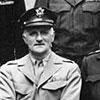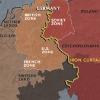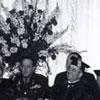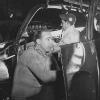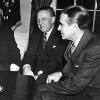 Initially partitioned into British, French, American and Russian sectors, Berlin’s location well behind Russian lines made it an ideal pawn in the deteriorating relationship among former allies. In 1946, British Prime Minister Winston Churchill gave a speech at Westminster College, Missouri—pictured here—describing an “iron curtain” descending across the European continent, dividing east from west.
Initially partitioned into British, French, American and Russian sectors, Berlin’s location well behind Russian lines made it an ideal pawn in the deteriorating relationship among former allies. In 1946, British Prime Minister Winston Churchill gave a speech at Westminster College, Missouri—pictured here—describing an “iron curtain” descending across the European continent, dividing east from west.
Read the following excerpt from his speech.
…Now I come to the second danger of these two marauders which threatens the cottage, the home, and the ordinary people—namely, tyranny. We cannot be blind to the fact that the liberties enjoyed by individual citizens throughout the British Empire are not valid in a considerable number of countries, some of which are very powerful. In these States control is enforced upon the common people by various kinds of all-embracing police governments. The power of the State is exercised without restraint, either by dictators or by compact oligarchies operating through a privileged party and a political police. It is not our duty at this time when difficulties are so numerous to interfere forcibly in the internal affairs of countries, which we have not conquered in war. But we must never cease to proclaim in fearless tones the great principles of freedom and the rights of man which are the joint inheritance of the English-speaking world and which through Magna Carta, the Bill of Rights, the Habeas Corpus, trial by jury, and the English common law find their most famous expression in the American Declaration of Independence.…
A shadow has fallen upon the scenes so lately lighted by the Allied victory. Nobody knows what Soviet Russia and its Communist international organization intends to do in the immediate future, or what are the limits, if any, to their expansive and proselytizing tendencies. I have a strong admiration and regard for the valiant Russian people and for my wartime comrade, Marshal Stalin. There is deep sympathy and goodwill in Britain—and I doubt not here also—towards the peoples of all the Russias and a resolve to persevere through many differences and rebuffs in establishing lasting friendships. We understand the Russian need to be secure on her western frontiers by the removal of all possibility of German aggression. We welcome Russia to her rightful place among the leading nations of the world. We welcome her flag upon the seas. Above all, we welcome constant, frequent and growing contacts between the Russian people and our own people on both sides of the Atlantic. It is my duty however, for I am sure you would wish me to state the facts as I see them to you, to place before you certain facts about the present position in Europe.
From Stettin in the Baltic to Trieste in the Adriatic, an iron curtain has descended across the Continent. Behind that line lie all the capitals of the ancient states of Central and Eastern Europe. Warsaw, Berlin, Prague, Vienna, Budapest, Belgrade, Bucharest and Sofia, all these famous cities and the populations around them lie in what I must call the Soviet sphere, and all are subject in one form or another, not only to Soviet influence but to a very high and, in many cases, increasing measure of control from Moscow. Athens alone—Greece with its immortal glories—is free to decide its future at an election under British, American and French observation. The Russian-dominated Polish Government has been encouraged to make enormous and wrongful inroads upon Germany, and mass expulsions of millions of Germans on a scale grievous and undreamed-of are now taking place. The Communist parties, which were very small in all these Eastern States of Europe, have been raised to pre-eminence and power far beyond their numbers and are seeking everywhere to obtain totalitarian control. Police governments are prevailing in nearly every case, and so far, except in Czechoslovakia, there is no true democracy. Turkey and Persia are both profoundly alarmed and disturbed at the claims which are being made upon them and at the pressure being exerted by the Moscow Government. An attempt is being made by the Russians in Berlin to build up a quasi-Communist party in their zone of Occupied Germany by showing special favors to groups of left-wing German leaders. At the end of the fighting last June, the American and British Armies withdrew westwards, in accordance with an earlier agreement, to a depth at some points of 150 miles upon a front of nearly four hundred miles, in order to allow our Russian allies to occupy this vast expanse of territory which the Western Democracies had conquered.
If now the Soviet Government tries, by separate action, to build up a pro-Communist Germany in their areas, this will cause new serious difficulties in the British and American zones, and will give the defeated Germans the power of putting themselves up to auction between the Soviets and the Western Democracies. Whatever conclusions may be drawn from these facts—and facts they are—this is certainly not the Liberated Europe we fought to build up. Nor is it one which contains the essentials of permanent peace.…
In 1948, the Soviets sealed off overland traffic into the British, French, and American sectors, intending to starve out Western forces. President Harry S. Truman’s administration responded with a round-the-clock airlift to Berlin, delivering vital supplies by aircraft for eleven months until Stalin finally lifted the blockade. The Berlin crisis demonstrated the stark reality of Churchill’s “iron curtain” metaphor.
Source:
Westminster College, “Churchill's giving the 'Iron Curtain' Speech” (accessed April 24, 2018).





